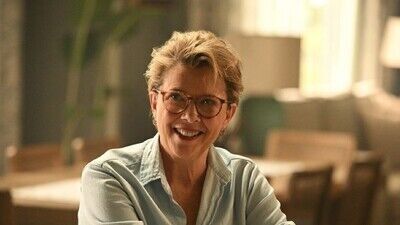What unfurls is Faulkernesque as we see Joy via her family’s flashbacks. She powers the plot but does so mostly in her absence as we see her from others’ points of view. Thanks to these perspectives, we do get a strong sense of who she was—the rock, the one who held it all together but somehow was invisible to those closest to her. More than once, one of her kids exclaims “She saved me.” But, when she was there, they largely took her for granted.
There’s a particularly devastating revelation that on the day she disappeared she called each of her four children, and none of them bothered to pick up their phones. In fact, we see her loneliness in her attachment to Savanah (Georgia Flood playing both warm and conniving to much effect). As we see, Savannah’s a lost soul who worms her way into the Delaney home, mostly by listening to Joy and helping her around the house (what a thought!)—things her own family has neglected for decades. There’s a scene where Joy tells Savanah, “No one breaks your heart like your own kids,” and that could very well be the moral of this story. “Apples Never Fall” becomes a treatise on the ways we fail women, big and small, which shouldn’t surprise as it’s based on a book by Liane Moriarty of “Big Little Lies” fame.
As the series moves about its plot—with a compelling mystery that remains open until the last episode—two tragedies compete in its framework. There’s Joy’s disappearance and potential violent death. And there’s the fact that despite “saving” her kids, despite loving them fiercely, taking care of them even when it meant sacrificing her own piece of mind, none of them truly value her. She’s done women’s work and despite it being literally lifesaving (not to mention creating), they refuse to see her. Even outside of the domestic sphere, she doesn’t get credit from her family until is perhaps too late—she was also a competitive tennis player in her own right and ran the club with her husband, but it’s Stan’s career that gets the kids’ and thus our attention.
The cast does the work to make this tension relatable and fraught. Allison Brie as elder daughter Amy inhabits her character’s woo-woo beliefs, building distinct mannerisms that telegraph her inner struggles. Under her thoughtful care, Amy isn’t a caricature or a wounded spirit, she’s a woman struggling to find her place when she’s so different from those who raised her. After his turn as the ever-petulant newlywed in “The White Lotus,” Jake Lacy is cornering the market for rich assholes with Troy Delaney. Troy makes his fair share of mistakes but seems more hurt this time around, someone with a festering father wound and no idea how to heal it. Likewise, younger siblings Brooke (Essie Randles) and Logan (Conor Merrigan Turner) are all big, scared eyes—except for when they aren’t. Sometimes, even the most innocent Delaneys are the ones who lash out, unable to follow their mother’s example as it looms so small in their imagination.

